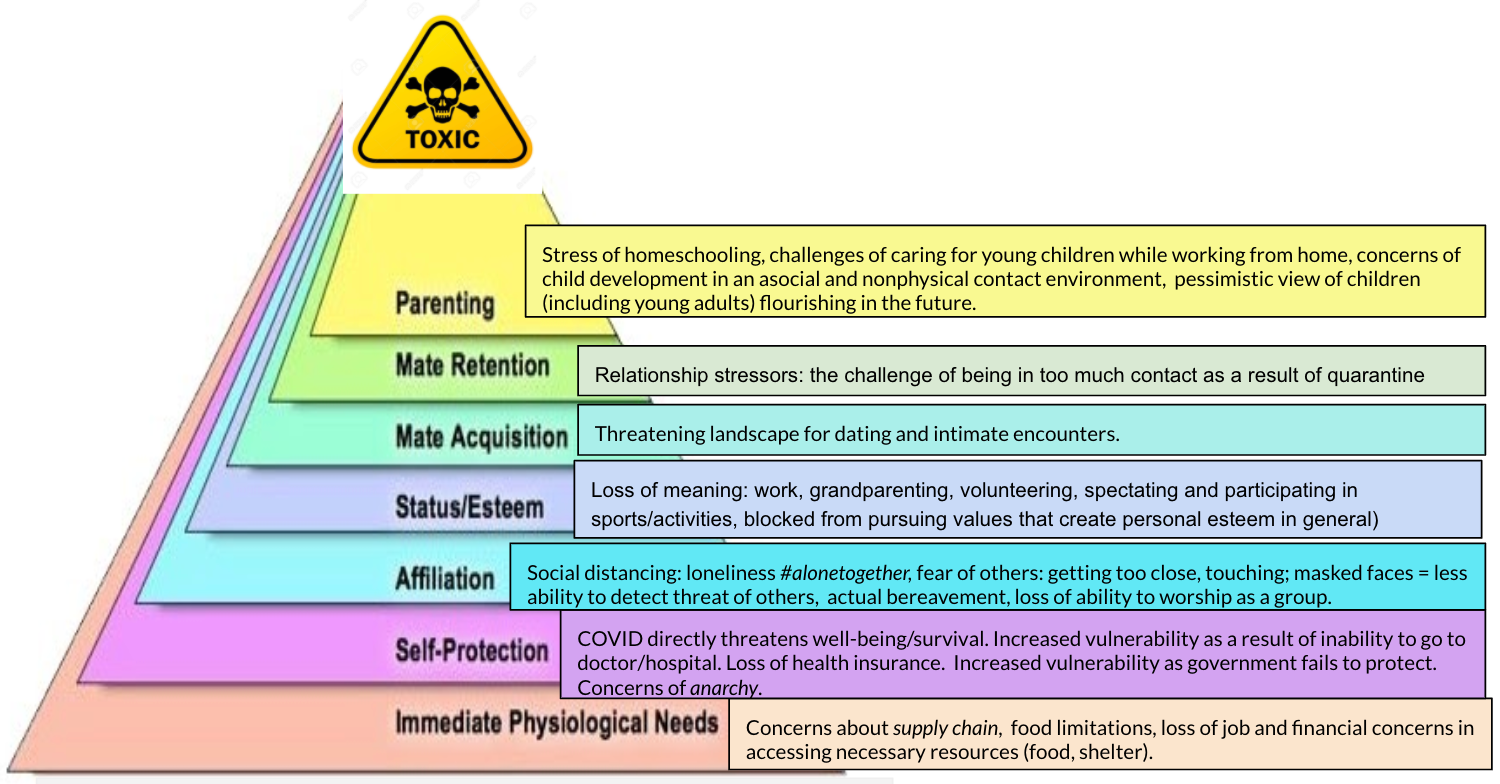A mental health pandemic has developed amidst the COVID-19 pandemic, and the increasing number of COVID cases in the United States and resulting shelter-in-place mandates will continue to result in deterioration of mental health. A recent survey found that one-third of Americans have reported signs of anxiety and/or depression since the start of the COVID-19 pandemic, though it’s likely this percentage is even higher—and these rates are substantially greater when compared to survey results prior to the pandemic. Moreover, it’s likely that the emotional consequences of the pandemic will only continue to grow.
Researchers have hypothesized for many years about how the modern environment disrupts the ability to satisfy our human nature. Our evolved human nature is tied to qualities, or motives, that allow for successful survival and reproduction throughout human evolutionary history.
These motives are considered human universals, which means nearly all humans possess these needs. In a somewhat hierarchical fashion, our core human nature consists of the following:
- Meeting essential physiological needs
- Finding safety and self-protection
- Social affiliation and connection
- Achieving esteem and status
- Acquiring and maintaining a mate
- Parenting offspring in a way that they can flourish
While this may be an oversimplification, it’s worth noting that much of the emotional distress individuals experience (e.g. anxiety, sadness, anger) is associated with the perception of not meeting these needs. Negative emotions are adaptations that ultimately motivate individuals to attempt to fulfill a need, whereas positive emotions (e.g. happiness, pride, love) are associated with satisfying these needs.
So, how has the COVID-19 pandemic impacted our ability to satisfy our human needs? Enormously! The following figure is Kenrick’s pyramid of human needs with my additions on the right regarding specific challenges the pandemic has created:

As demonstrated in the figure, failure to meet these human needs will result in chronically negative emotional states, particularly anxiety (due to perceptions of danger as it applies to the novel coronavirus) and depression (due to the enormous number of losses people have experienced).
As COVID cases rapidly increased in the United States, the consequent psychological distress became clear. In conjunction with my doctoral students, we developed an online self-help guide to address many of the negative emotional states as outlined in the figure above. The strategies included in this guide are evidence-based psychological treatments for individuals suffering from anxiety disorders, depression, and negative emotions in general. This online self-help guide may be enough assistance for many people, though for those who need additional assistance, we recommend seeking professional help.
Since so many people are struggling as a result of the COVID-19 pandemic, we’ve started to conceptualize these symptom clusters as Pandemic-Related Stress Disorder (PRSD). PRSD interventions provide cognitive behavioral emotion regulation skills tailored to address emotional states secondary to COVID-related challenges and stressors. More can be read about the nature and treatment of PRSD here, and you can hear more about this in detail here.
Humans are resilient, and we will see ourselves through the COVID and mental health pandemics. Nevertheless, it is critical that we identify and provide treatment for those with pandemic-related mental health issues now in order to ameliorate a mental health pandemic that lasts far beyond the COVID-19 crisis.
**Feature photo by Tim Mossholder on Unsplash
Interested in contributing to the Harvard Primary Care Blog? Review our submission guidelines
Interested in other articles like this? Subscribe to our bi-weekly newsletter

William C. Sanderson, PhD, is a Clinical Psychologist, Professor of Psychology, and Director of the Anxiety & Depression Clinic and PhD Program in Clinical Psychology at Hofstra University, where he teaches and conducts research on the nature and treatment of anxiety disorders and depression (and evolutionary psychology). Dr. Sanderson is a Founding Fellow of the Academy of Cognitive Therapy and is presently a Board Member. He has published more than 100 articles (including 7 books), primarily in the areas of anxiety, depression, personality disorders, evidence-based treatments, and cognitive behavior therapy.
- Share
-
Permalink


